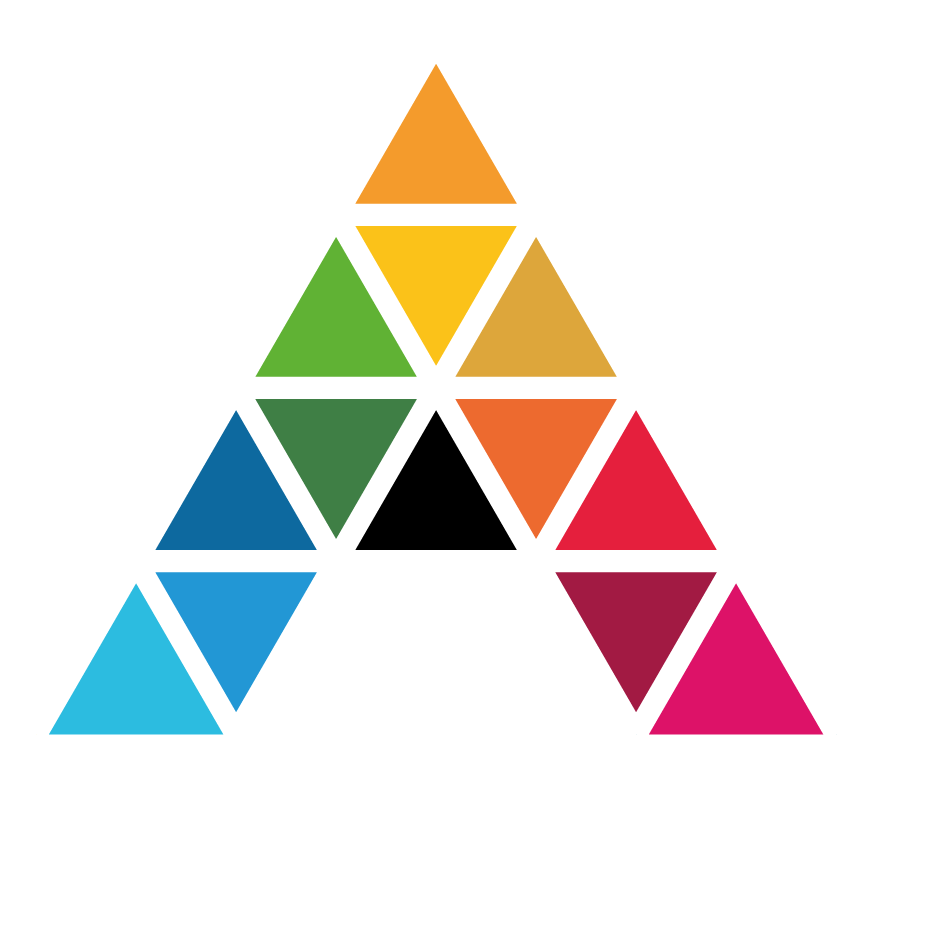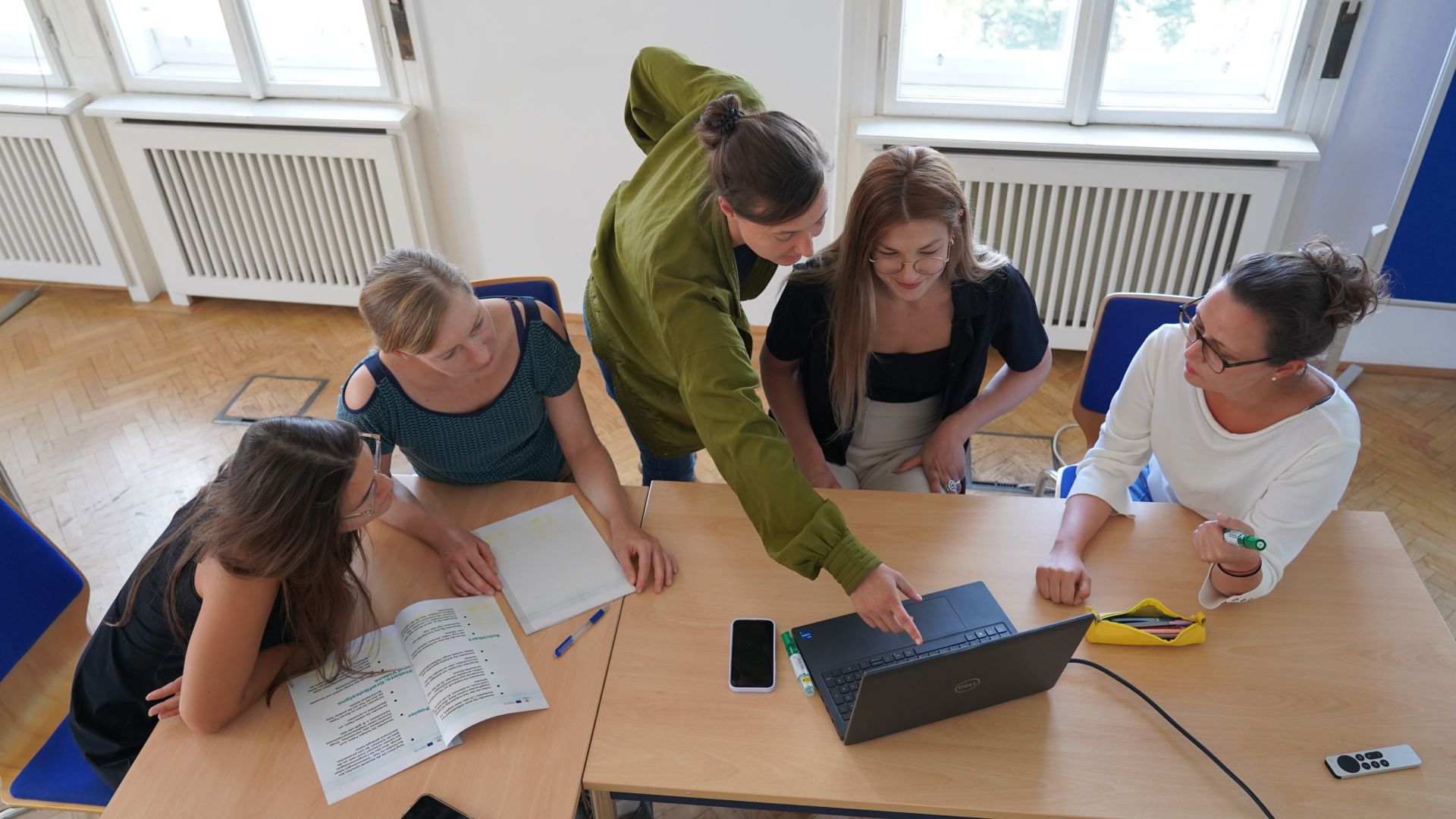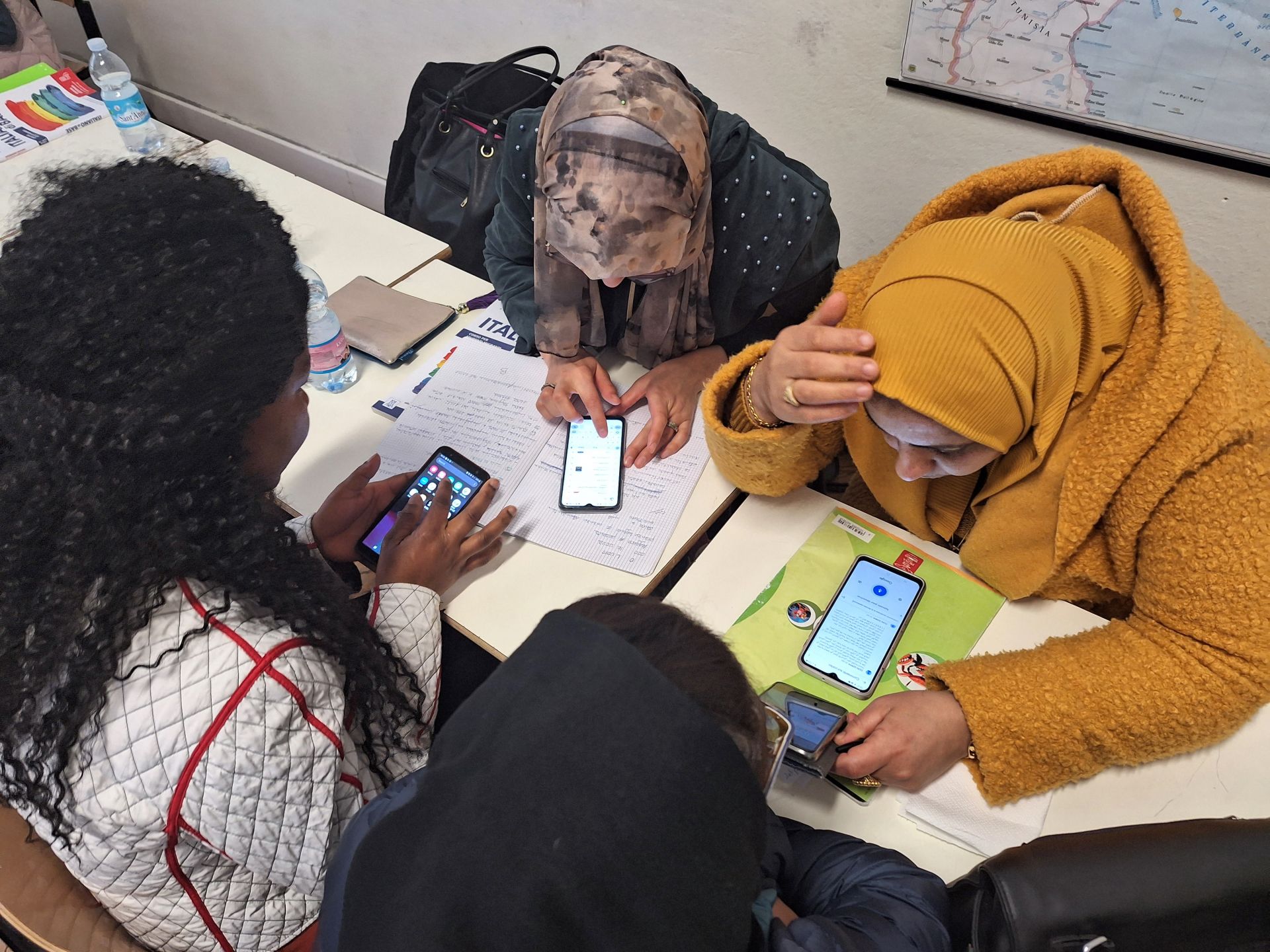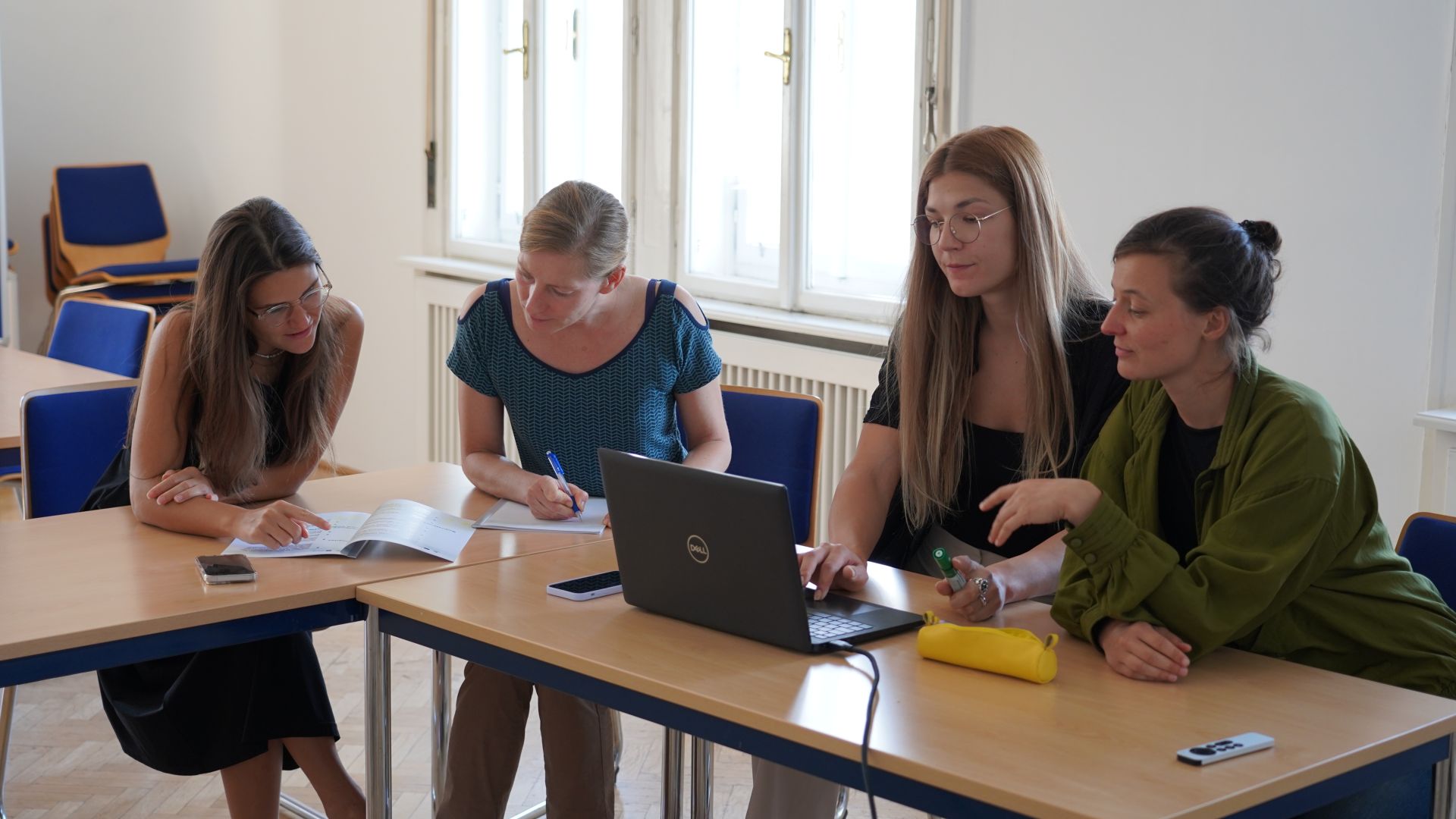Move-Up News
3rd International Webinar -
‘Designing learner-centered upskilling initiatives: from outreach, to self-assessment and customized training’
The MOVE-UP project is developing a flexible and quality upskilling pathway for unemployed women who are dedicating most of their time and efforts to the role of mother and who are in need to (re) join education activities and the job market.
In this last phase of the project, the consortium is focusing on the overall design of inclusive upskilling pathways and initiatives and to engage with other stakeholders for future initiatives, leveraging the core results of the project: the Outreach strategy, the Self-assessment and Evaluation Toolkit and the Training plan.
If you are interested in developing inclusive upskilling and reskilling pathways for adults , we invite you to join us for our last MOVE-UP Alliance International Webinar on 26 November 2024 at 16.00 CET to discuss the core components of a successful upskilling initiative and to share ideas for new potential activities.
Registration: https://forms.gle/g6PYUUKatCWCYUmE7
For more information: Viola Pinzi - viola.pinzi@eaea.org
Agenda of the Webinar
From contextualized outreach to customized training - Speaker: Chiara Marchetta, FORMA.Azione, MOVE-UP project manager – 10’
* Strategic aspects to design inclusive upskilling pathways and initiative for all citizens.
Panel discussion - 40'
- Moderator : Sylvia Liuti, FORMA.AZIONE, MOVE-UP principal advisor and gender expert
- Speakers from European institutions, policy makers, education networks and social inclusion sector
* Building up from MOVE-UP: strategic ideas for new initiatives - Group discussions in break out rooms – Moderated by: Viola Pinzi, EAEA, Head of projects, with input from MOVE-UP partners and webinar participants – 30’
* Conclusions and opportunities for collaboration
- Speaker: Chiara Marchetta, FORMA.Azione, MOVE-UP project manager – 10’'
2nd International Webinar -
‘Self-assessment approaches for adult learners’
MOVE-UP initiative aims to improve approaches for self-assessment activities with adult learners to support their participation in upskilling pathways.
The MOVE-UP project is developing a flexible and quality upskilling pathway for unemployed women who are dedicating most of their time and efforts to the role of mother and who are in need to (re) join education activities and the job market.
One of the focus of the consortium is also adapt and test self-assessment and evaluation tools for adult learners related to PSL competences (Personal, Social and Learning to Learn) and basic skills (digital, financial etc.).
If you are interested in
supporting adults to re-join education activities and to enhance Personal
Social and Learning competences as well as basic skills, we invite you to join us for our second MOVE-UP Alliance International
Webinar on 24 June 2024 at 16.00 CEST ‘Self-assessment approaches for adult
learners’’ to hear and share experiences and good practices on how to
improve adult participation in education across Europe.
For more information: Viola Pinzi - viola.pinzi@eaea.org
Agenda of the Webinar
A journey towards new competences for women experiencing motherhood - Speaker: Viola Pinzi, EAEA - 5'
* Strategic aspects for self-assessment with adult learners.
Challenges and enablers to engage adult learners in meaningful self-assessment processes - Panel discussion - 40'
- Moderator : Sylvia Liuti, FORMA.AZIONE, MOVE-UP principal advisor and gender expert
- Speakers:
- Michele Tucio, Economist - Skills and Employability Division, OECD
- Alessandro Brolpito, Senior Human Capital Development Expert - Digital Skills and Learning, ETF
- Pauline Boivin, Project and Policy Manager, Lifelong Learning Platform and TRANSVAL-EU project
- Assessment experts, Adult learning organisation - TBC
* MOVE-UP Self-assessment and evaluation toolkit: development and key-findings - Panel discussion - 40'
- Moderator: Chiara MArchetta, FORMA.AZIONE, MOVE-UP Project Manager
- Speakers - MOVE-UP partners in Austria, Greece, Italy and Portugal
- Zara Sousa, APEFA, Portugal
- Anastasia Zafeiropoulou, Academy of Entrepreneurship, Greece
- Franka De Syo, Die Berater, Austria
- Giulia De Luca, RIDAP, Italy
* Conclusions and opportunities for collaboration
-Speaker: Viola Pinzi, EAEA - 5'
Outreach Strategy is officially out!
Key takeaways on the development phase:
-
The main target group in the four collaborating countries varies in profiles and characteristics throughout the strategy's design phases.
-
These women are vulnerable to social exclusion due to gender, education, and employment factors. The transition to parenthood is a critical period, often exacerbating inequalities and intersectional discrimination, further intensified by the impact of the COVID-19 pandemic.
-
The MOVE-UP stakeholder approach aims to mobilise stakeholders in different countries in developing and implementing activities.
-
Peer learning and reviewing methodologies involve practitioners, foster systemic change for lifelong learning, and promote gender equality.
-
The Adult Education systems must adopt a gender-oriented approach, considering women's specific needs and skills acquired as mothers.
MOVE-UP - International Webinar ‘’Reaching out to adult learners: Key success factor for upskilling pathways’’
What are we working on?
The first phase of activities of the MOVE-UP project International Alliance are focusing on investigating and sharing experiences on the best approach to outreach to adults’ learners, to support them in accessing education activities and possibly the labour market.
This first International Alliance Webinar focuses on challenges and enablers for ALE organisations (Adult Learning and Education) to reach, inform, guide and mentor adult women to join or re-join the education system, from the perspective of policy makers, educators and the learners themselves.
If you are interested in supporting adults to re-join education activities and to enhance Personal Social and Learning competences as well as basic skills (literacy, digital, financial etc.), we invite you to join us this online seminar on 16 November at 16.00 CET, to give us feedback on our outreach strategy and share your experiences and good practices on how to improve adult participation in education across Europe.
Registration: https://forms.gle/LBCigKwZsb3iNXcW6
For more information: Viola Pinzi - viola.pinzi@eaea.org
Agenda of the Webinar
A journey toward new competences for women experiencing motherhood
Speaker: Chiara Marchetta, MOVE-UP Project manager – 10’
* Why is outreach fundamental for inclusive and successful ALE programs and upskilling pathways?
Challenges and enablers to reach and engage with women who wants to (re) join education activities – Panel discussion – 30’
Moderator: Sylvia Liuti, MOVE-UP principal advisor and gender expert
Speakers: Pinelopi Theodorakakou, Women on Top, Greece,
Lorraine O’Connor, AONTAS, Ireland - TBC
* The experience corner
MOVE-UP outreach strategy and key findings from the analysis of 40 good practices
Speaker: Flavia Virgilio, RIDAP, Italy - 10’
* The experience corner
Good practices of outreach for ALE programs – 30’
Moderator: Viola Pinzi, EAEA, Head of projects
Speakers: coordinators representing the good practices selected and analysed by the MOVE-UP project
- Patricia Santos, Associação Social Recreativa Cultural e Bem Fazer Vai Avante - Espaço
- Angeliki Giannakopoulou, EAEA/Dafni KEK – European project OED – Outreach Empowerment Diversity
- Crescer Helen Cormack, SWAPWest, Scotland – MASTER project
- Natassa Grigoraki, Women Do Business, Greece
* Key take aways and opportunities for collaboration – 10’




